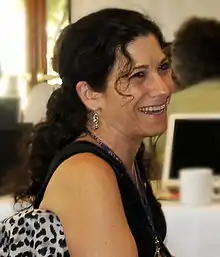Deborah Estrin
Deborah Estrin (born December 6, 1959) is a Professor of Computer Science at Cornell Tech. She is co-founder of the non-profit Open mHealth and gave a TEDMED talk on small data in 2013.[1] Estrin is known for her work on sensor networks, mobile health, and small data. She is one of the most-referenced computer scientists of all time, with her work cited over 128,000 times according to Google Scholar.[2]
Deborah Estrin | |
|---|---|
 | |
| Born | Deborah Lynn Estrin December 6, 1959 |
| Citizenship | United States |
| Alma mater | U.C. Berkeley, MIT |
| Known for | mobile health, small data, networked sensing |
| Scientific career | |
| Fields | Computer Science |
| Institutions | Cornell Tech |
| Doctoral advisor | Jerome H. Saltzer |
| Doctoral students | Chalermek Intanagonwiwat, Gene Tsudik |
Career
Estrin earned a PhD in Electrical Engineering and Computer Science from MIT in 1985, under the supervision of Jerry Saltzer.[3] She has also received honorary degrees recognizing her work: a degree honoris causa from EPFL in 2008,[4] and an honorary doctorate degree from Uppsala University, Sweden in 2011.[5]
Estrin was a Professor of Computer Science at UCLA between 2001 and 2013, where she was the founding director of the NSF-funded Center for Embedded Networked Sensing (CENS). In 2012, Cornell Tech announced Estrin as the first academic hire to the high-tech campus in New York City.[6] At Cornell Tech, Estrin is the Robert V. Tishman '37 Professor of Computer Science.[7] She is also the founder of the Health Tech hub and director of the Small Data Lab,[8] and a member of the Connected Experiences Lab.[9]
Estrin's research has focused on using mobile devices and sensors to collect and analyze data, with applications to health and well-being.[3] Her non-profit startup, Open mHealth, created open data sharing standards and tools that allow developers of health applications to store, process, and visualize data.[10] Her research also explores immersive recommendation systems and the privacy implications of user modeling and data use.[3]
Estrin has received numerous academic and popular recognitions for her research. She was named one of Popular Science's "Brilliant 10" in 2003.[11] In 2007, she was elected a Fellow of the American Academy of Arts and Sciences, and in 2009 was inducted into the National Academy of Engineering. She is a fellow of the ACM and the IEEE.[12] In 2018 she was elected as a McArthur Fellow for "Designing open-source platforms that leverage mobile devices and data to address socio-technological challenges such as personal health management".
She is the daughter of the late Gerald Estrin, also a UCLA Computer Science professor, and of the late Thelma Estrin, a pioneering engineer and computer scientist also at UCLA. She is the sister of Judy Estrin, and a wife to Ache Stokelman.
Awards
- 1987: National Science Foundation's Presidential Young Investigator Award
- 2007: Anita Borg Institute Women of Vision Award for Innovation[13]
- 2008: Doctor Honoris Causa EPFL
- 2009: National Academy of Engineering
- 2011: Doctor Honoris Causa Uppsala University, Sweden
- 2017: IEEE Internet Award
- 2018: MacArthur Genius Grant[14]
Estrin is featured in the Notable Women in Computing cards.[15]
See also
- Henry Samueli School of Engineering and Applied Science
References
- "Deborah Estrin". TEDMED. Retrieved 2018-12-21.
- "Deborah Estrin - Google Scholar Citations". scholar.google.com. Retrieved 2018-12-21.
- "Deborah Estrin". destrin.smalldata.io. Retrieved 2018-12-21.
- "Direction - EPFL". direction.epfl.ch. Archived from the original on 2008-09-24. Retrieved 2008-10-13.
- Networks, Uppsala Center for Wireless Sensor (6 September 2006). "WISENET". www.wisenet.uu.se.
- "Deborah Estrin is first NYC tech campus faculty member - Cornell Chronicle". www.news.cornell.edu.
- "Cornell Tech - Deborah Estrin". Cornell Tech. Retrieved 2018-12-11.
- "small data lab". smalldata.io. Retrieved 2018-12-11.
- "Connected Experiences Lab". Retrieved 2018-12-11.
- "Digital Health Records". Open mHealth. Retrieved 2018-12-21.
- "PopSci's 2nd Annual Brilliant 10". popsci.com.
- "Deborah Estrin". Cornell Tech.
- Fuller, Brian (18 October 2005). "Perlman, Samuelson, Tsao, honored for innovations". EETimes. UBM Electronics. Retrieved 29 June 2011.
- "Deborah Estrin - MacArthur Foundation". www.macfound.org. Retrieved 2018-12-21.
- "Notable Women in Computing".
External links
| Wikimedia Commons has media related to Deborah Estrin. |
- TEDMED talk on small data, 2013
- Open mHealth
- Biography of Deborah Estrin
- Publications
- Video (6 min.) of Deborah Estrin being awarded the Anita Borg Institute's Women of Vision Award, 2007
- Video (4 min.) of Deborah Estrin's acceptance speech for the Anita Borg Institute's Women of Vision Award, 2007
- Center for Embedded Networked Sensing (CENS) home page
